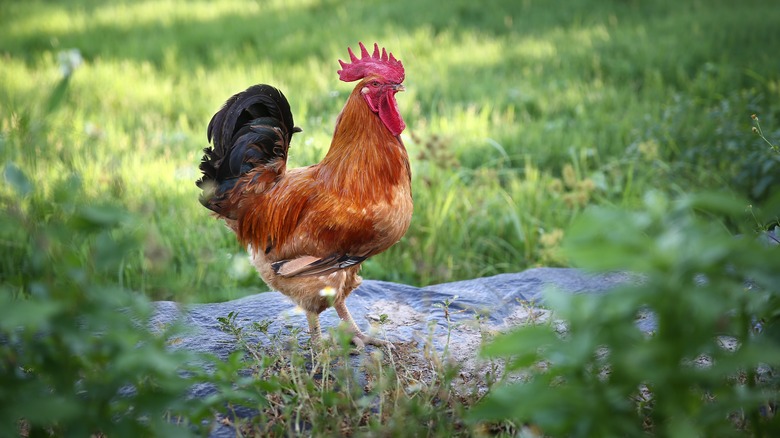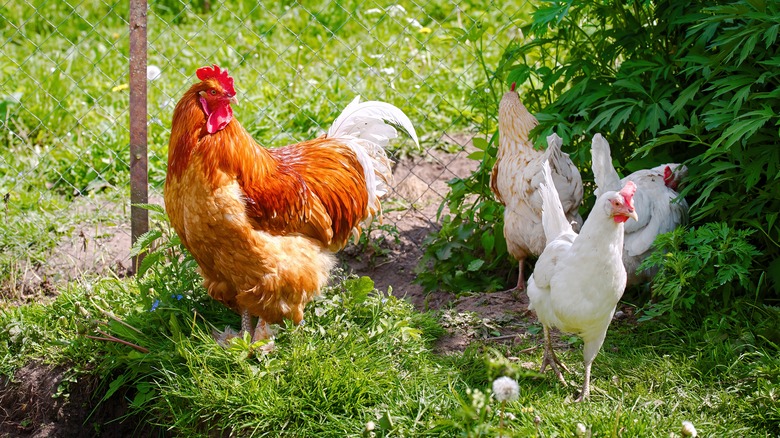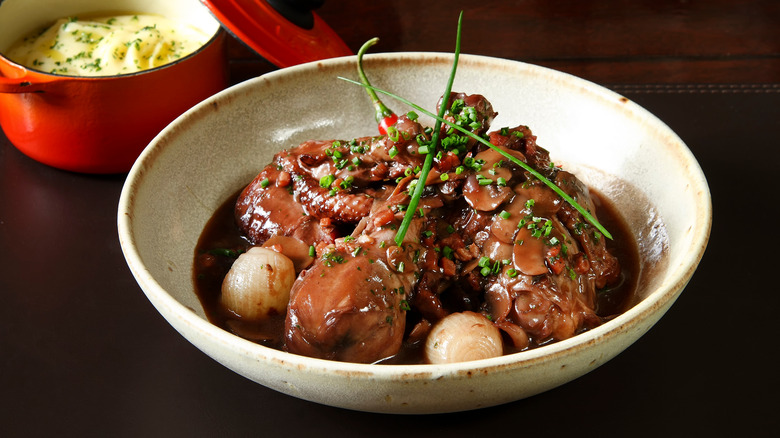Can You Eat Rooster Meat (And What Does It Taste Like?)
Have you ever stopped to contemplate the sex of your chicken tendies? It seems unlikely — we're not typically inclined to consider the personal lives of the animals we eat — so it may surprise you to learn that any chicken you eat is all but guaranteed to be female. The reason behind this astounding imbalance is rather grim. As with most animals, the odds that a baby chicken will turn out male or female are about 50/50, but hens are far more economically valuable to farmers than roosters, so most male chicks are culled (slaughtered). Farmers typically keep just one rooster for each flock of hens. This is because housing multiple roosters is a nightmare.
Roosters are aggressively territorial, and the very existence of cockfighting shows the lengths they can go to for alpha status. Roosters will fight to the death if one feels the other is encroaching on their territory, and for farmers, the logistical nightmare of housing these birds makes them undesirable. Sometimes, young males are castrated (they are then known as capons), but this practice is rare in the U.S. That's why you don't find male chicken meat in grocery stores, but of course, it's perfectly edible. Despite not raising them for commercial purposes, many farmers make meals from their roosters, and in many cultures around the world, their meat is even prized above that of hens. If you get your hands on some rooster meat, here's what you need to know about it.
Is rooster meat healthy?
It should come as no surprise that rooster meat is very similar to hen meat, and you'll find that applies to both its flavor and nutritional value. Rooster meat is a rich source of protein, and it also provides important micronutrients like B vitamins and zinc. The most crucial difference between hens and roosters from a culinary standpoint is the distribution of fat in their bodies. Most of the fat in a rooster lies directly below its skin, making it easy to remove when you butcher it. This gives you a very lean piece of meat, but there is a drawback. Since there's little fat within the muscle itself, rooster meat can turn out very tough if you don't cook it just right (and don't worry, we'll get to that). Hens, in contrast, contain more intramuscular fat, particularly in their dark meat regions. This makes their meat more tender and forgiving to cooks.
Cooking with rooster meat
Since rooster meat is so lean, it needs to be cooked low and slow. Fast, high-heat preparations such as frying and grilling will make the meat tough and stringy. Toughness becomes a bigger problem as the rooster nears the end of its natural life (a typical rooster's lifespan is five to eight years). Roosters are best suited to stews and slow cookers, where they can gently tenderize over hours. A fantastic slow-cooked option is coq au vin, a French dish whose name means "rooster in wine." To get the most from the whole animal, try making chicken stock from rooster meat and bones. You can even eat a rooster's comb. It's especially popular in France and Italy.
As far as what a rooster tastes like, we're afraid the answer is pretty boring. As you've probably guessed, roosters taste like chicken. However, most people find rooster meat to be far more intense than hen meat — akin to dark meat turkey. This is due to the rooster's dense collection of muscle fibers. Some people love the stronger flavor, but others find it overwhelming, so you'll have to take a chance on it to figure out where you stand.


